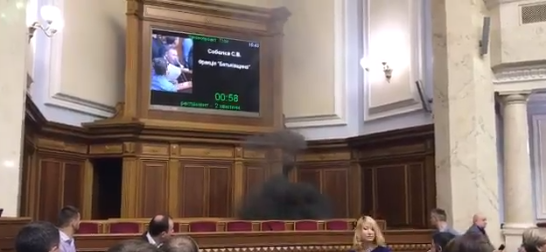On October 5, the Verkhovna Rada began consideration of two draft laws on the reintegration of Donbas, submitted by President of Ukraine Petro Poroshenko. Both laws are of top priority as they make possible the use of the UN peacekeeping contingent in Donbas. However, they bring forth a very painful public reaction, because there are fears that they can lead to an escalation of the war or, due to inaccurate definitions, make it impossible to return the uncontrolled territories of Donbas under Ukraine’s control. After heated debates, on Friday morning, deputies managed to reach agreement and adopted in the first reading a draft law “On special aspects of the state policy ensuring the state sovereignty of Ukraine over temporarily occupied territories in Donetsk and Luhansk regions” and a draft law “On the provision of necessary conditions for a peaceful settlement of the situation in certain districts of Donetsk and Luhansk regions.”
A clouded day in Parliament
From the very morning, deputies argued over both draft laws. Yurii Boiko, the leader of the Opposition Bloc, said they would separate Donbas from Ukraine. MP from Svoboda Party Yurii Levchenko threatened to set the Rada on fire. And Samopomich Party proposed an alternative draft law.
During the discussion of laws on Friday morning, a rally of about a hundred people was held close to the Verkhovna Rada. About 1,400 policemen and the National Guard servicemen were deployed to protect public order. A group of citizens tried to enter the Parliament building and scuffled refusing to let the police check their belongings for dangerous items. Administrative protocols on the subject of petty hooliganism were drawn up against three persons. In addition, there was a small fire near the Samopomich sector in the session hall, and the deputies could smell a pungent odour. It turned out that the abovementioned Yurii Levchenko threw a smoke grenade.
Law on temporarily occupied territories
The draft law on the reintegration of Donbas, for the first time in Donbas conflict, defines non-government-controlled territories in Donetsk and Luhansk regions as temporarily occupied and enshrines the priority of implementing the security provisions of the Minsk Agreements.
The boundaries of the temporarily occupied territories are determined by the Ministry of Defense upon submission of the General Staff of the Armed Forces of Ukraine. As a result of the debates, deputies decided to remove the mentioning of the Minsk Agreements from the law not to legitimize the illegal formations in Donbas, and to replace them with the UN Security Council Resolution adopted in connection with Russian armed aggression in Donbas.
Besides, this draft law for the first time defines Russia as an aggressor state and emphasizes that Ukraine is not responsible for the unlawful actions of Russia, its armed forces, other military formations and the occupation administration in the temporarily occupied territories. The activities of the Russian military and occupation administration are defined as illegal, and any act issued in connection with these activities – invalid. The document also stipulates a number of provisions in case of introducing a martial law.
The law on the special order of self-government in Donbas
The second draft law on Donbas proposes to extend the special order of local self-government in particular districts of Donetsk and Luhansk regions for a year. The current law comes to an end on October 18, so the adoption of the law was a matter of great urgency.
This special order still allows for pre-term local elections in Donbas, and, again, the legislator noted that this is possible only after the withdrawal of all illegal armed formations, their military equipment, as well as militants and mercenaries from the territory of Ukraine. Elections should be monitored by international observers. Guarantees of free expression of will and secret ballot, voting rights of internally displaced persons and transparent counting of votes should also be observed. The draft law was supported by Germany, France, the United States, and other countries.
First reactions
“LPR” and “DPR” representatives reacted adversely to the draft law. They stated that “the adoption of this draft law means only one thing – Ukraine chooses war.”
Special Representative of the US State Department for Ukraine Kurt Volker commented:
Special status extension shows #Ukraine ?? taking tough steps for peace. Hope #Russia ??now acts to make peace – time to end conflict.
— Kurt Volker (@SpecRepUkraine) October 6, 2017

